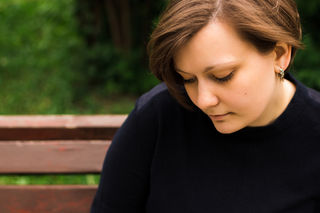Embarrassment
Why Do I Binge When I Feel Shame?
The role of shame in binge eating, emotional eating, and food addiction.
Posted February 26, 2020 Reviewed by Ekua Hagan

Binging, obsessing about food, or body dissatisfaction can all be ways in which we try to deal with shame.
What is shame? Brené Brown says, "Shame is an intensely painful feeling or experience that we are flawed and therefore unworthy of love and belonging."
When you were a child, if you were ever made to feel that something about you just wasn't right — for example, if you were criticized or bullied about your weight or shape, how much you were eating or what you were eating, this can cause shame. When you've been shamed as a child, you may have come to believe that you're bad or worthless. You then develop an inner critic who tells you you're bad whenever anything goes wrong in your life and that younger/child part of you believes it.
Here’s a recent story from one of my patients:
Joni struggles with binge eating. As a child, her parents sent her to Weight Watchers when she was 9 years old. She was teased about her weight in school and went from diet to diet — losing weight and then regaining it.
Recently, she went to visit her parents with her young son. She was anxious about the visit and sure enough, while there, her mother commented either about what she was eating or how much she weighed several times. She felt shame that she was still dealing with this problem after all this time. While there, she binged in secret almost every night and this also increased her feelings of shame.
On the way home, she stopped at McDonald’s and binged in the car. Her son began to cry and due to her own anxiety and guilt, she yelled at him. This only increased her guilt and the shame she had that "now I’m a bad mother too." She felt hopeless and worthless about ever gaining control of her eating and no longer feeling so miserable in her body. Sound familiar?
Shame is so powerful, it can make you afraid of making any mistakes which leads to secrecy and perfectionism.
Why do you binge or overeat when you feel shame? Because shame is one of the most awful emotions to feel and is hard to tolerate. Shame makes you feel like you want to disappear, it can feel like your heart is being ripped from your chest or like you've been punched in the gut. Most of us would do anything NOT to feel shame. So you may have turned to food.
Being shamed in childhood can cause more severe binging behaviors.
But the problem is that even though you may feel better for a short time after a binge, you may then feel more shame because you binged. Binge eating increases feelings of shame and perpetuates the vicious cycle of shame. Experiencing shame in childhood can also be related to abuse or childhood trauma. But what shame ultimately does is rob you of a sense of security and self-acceptance that can plague you throughout your life.
There is a big difference between shame and guilt.
Guilt is saying: "I did a bad thing." Shame is saying: "I am a bad person." The Buddhists say: "Pain is part of the human condition." This means none of us are perfect and ALL of us deserve compassion and understanding.
The best way to deal with shame is through self-compassion.
Self-compassion is being kind and understanding towards yourself, despite your mistakes. It's not about waiting to have the life you want, until you can be "perfect" or until you can feel worthy. It's about accepting yourself right now, flaws and all. Being nice to yourself, particularly during a personal setback or a stressful experience, is known as self-compassion.
If you can see yourself in a new light, as someone going through a process, and if you can see that all the challenges and what you may have called failures along the way are just part of that journey, it may help you recognize that what’s ahead on your journey is up to you and is all part of your process.
Studies show that if you respond to life’s difficulties with self-compassion, this can reduce depression, stress, performance anxiety and body dissatisfaction, increasing happiness, self-confidence and immune function.
The most important person to have compassion for is yourself.
The deepest healing is awakening to who you truly are—seeing yourself, your flaws, and your mistakes with compassion. When this happens, you will find yourself moving beyond just the focus on behaviors (binging, emotional eating, etc.). Over time, as you come to know yourself, stop judging your past, and accept your character flaws, you will feel more compassion toward other people as well.
4 ways to cultivate self-compassion
- First, you must notice your own suffering. Admit the pain you feel from your binge eating, compulsive overeating, emotional eating, or food addiction.
- Open your heart to accept and notice the suffering your eating behaviors have caused.
- The Buddhists say, “Pain is part of the human condition.” This means none of us are perfect and all of us deserve compassion and understanding.
- Think of ways you can treat yourself with more compassion. Many people who have trouble feeling self-compassion can imagine being compassionate towards a small child or a pet. So think of how you can give yourself the same care you would give to a small child or pet.
Click here to download the self-compassion meditation.




